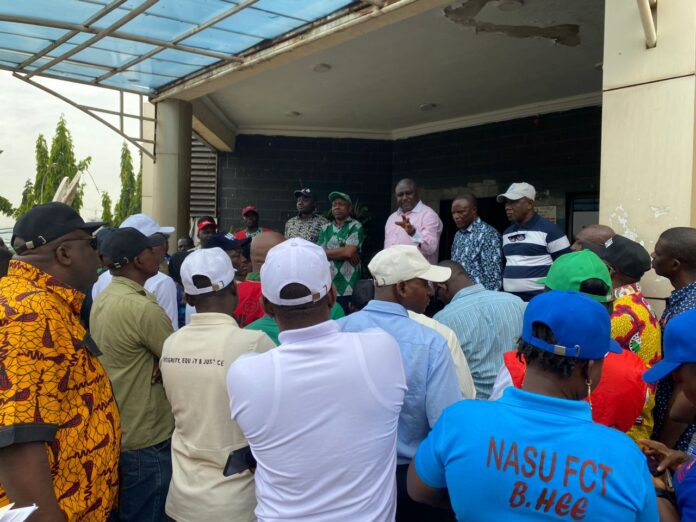By RSM reporters
Labour leaders must organise the struggle properly until the government backs down on:
-securing a living minimum wage
-reversing all anti-poor policies
-withdrawing all threats against labour leaders
Organised Labour Grounds Nigeria’s Economy
From 12 a.m. on June 3, 2024, Nigerian workers went on strike to demand a new minimum wage and the reversal of all anti-poor policies. The strike reported a high degree of compliance: Nigerian airports were shut down, banks were closed, and the nation’s power grid was disabled by electricity workers. In response, the Federal Government responded with lies, propaganda and threats. The Federal offered a partial minimum wage of 60,000 Naira in an attempt to appease the organised private sector, this is far to the 497,000 demand by the organized labour.
The truth is that inflation in the country has reached 34% since the Tinubu government came to power and announced the removal of subsidies. Ordinary people’s monthly incomes can’t cover basic needs with the current cost of living. Life has become miserable, while the ruling class continues to live in massive wealth at the expense of the public.
Nigeria’s trade union centres have shown the Tinubu government that people are fed up with this situation. Workers demonstrated their mighty power by shutting down the country despite government threats.
A few months ago, Nigerians witnessed a 300% increase in electricity tariffs, high inflation, and continued anti-people policies of the Tinubu government. The cost of living has increased, and transportation costs have tripled.
Tension Over Intimidation
The Federal Government attempted to break the strike by using the media to claim that the strike was premature and that the labour leaders’ demands were unrealistic. The government urged people not to obey the strike. Through the Attorney General of the Federation and Minister of Justice, Lateef Fagbemi (SAN), the government issued a warning in a statement ahead of the nationwide strike on Sunday.
Fagbemi stated that Section 18 of the Trade Disputes Act requires workers employed in essential services to give their employer 15 days’ notice before ceasing their services. Those who did not comply would be liable, upon conviction, to a fine or imprisonment for six months. Workers who embarked on an indefinite strike on Monday morning, June 3, 2024, were warned that they risked a six-month jail term. However, this was indefensible, as on May 1, during the May Day rally, the two union centres had already sent out a notice of strike if the government did not agree on the new minimum wage by May 31.
In reality, all the threats were mere attempts to break the strike. As it turned out, the warnings did not stop workers from proceeding with their action. Before the government could react, economic activities had been paralyzed across the country, with flights disrupted and the national grid shut down.
Federal, State, and Local Governments, as well as the Organised Private Sector, Must Pay New Minimum Wages to Workers
The Federal Government has enough resources to pay a decent minimum wage of at least 150,000 Naira, but the greed of the ruling class and has no limits.
Nigerian capitalists and billionaires hoard wealth, while the poor starve. National Assembly members received cars worth about 160 million Naira each last year, and 80 billion Naira was allocated for those traveling for Hajj in Mecca, Saudi Arabia.
Although there are sufficient funds to pay a decent wage, the organised private sector and the government claim that an increase in minimum wage will cause inflation or lead to worker layoffs. These claims are attempts to mobilise people against the unions. Inflation is inherent in the capitalist mode of production, due to the chaotic function of the “free market”. It is also due to the greed of capitalists, bankers and financiers.
We must demand that any private organisation that cannot pay the minimum wage should be taken over by the government, and run under workers control and management. Nigeria has both human and natural resourcesto take care of its people.
The two-day general strike was successful, even though the second day was relaxed by labour leaders to allow further negotiations with the tripartite committee and the federal government. However, the first day showed the mighty power that workers have when they stand up to fight.
The Revolutionary Socialist Movement (RSM) will continue to stand in solidarity with the working people of Nigeria and will continue to urge labour leaders to properly organise the fight until the government is forced to back down.



